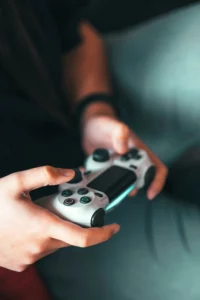The public has often feared new technologies and their impact on society, as was the case with television, video games, smartphones, and social media.
In the digital age, these fears are particularly focused on the negative impact of technology, including screen time and mobile phones, on everyday life and how they affect the stress and anxiety levels of young people.
The question is, how warranted are these fears, and are they substantiated with data that indicates any negative correlation between technology and anxiety?
Excessive Technology Use & Anxiety in the Digital Age
The relationship between technology use and mental health is complex.
While technology offers platforms for social connection, educational resources, and time management tools, it can also lead to social isolation, decreased physical activity, and disrupted sleep patterns when not used mindfully. These factors collectively contribute to increased anxiety connected to technology use.

Excessive technology use, or technology overuse, refers to excessive and compulsive time spent online on digital devices like smartphones, computers, and gaming consoles. This includes prolonged engagement on social media, online gaming, and other digital activities to the point that engagement with technology interferes with daily responsibilities and well-being.
Anxiety stems from the brain’s “Fight or Flight” response, originally crucial for survival against predators. Today, this response can be triggered by perceived threats related to financial stress, health concerns, relationship struggles, school and career worries, peer pressure, feeling powerless over social justice and environmental issues, and the fear of growing up.
Young adults struggling with an anxiety disorder may experience recurring, intrusive thoughts or worries about perceived threats that aren’t proportionate to the actual threats.
Excessive technology use can exacerbate this problem.
Can Too Much Technology Cause Anxiety in Young Adults?
Technology & Anxiety in College Students
According to a 2023 article titled Digital Anxiety: How technology and social media makes us anxious and what you can do about it., “19.1% of U.S. adults have been diagnosed with an anxiety disorder, and an estimated 31.5% of adults can expect to experience an anxiety disorder at some point in their lives.”
Several studies have explored the connection between technology use and anxiety. For instance, a 2016 study titled Mobile Device Addiction Linked to Depression, Anxiety involving college-age students discovered that while standard use of technology did not significantly impact mental health, misuse or addiction to mobile devices was linked to increased anxiety and depression levels.
Another study published in 2017, Internet Addiction May Indicate Other Mental Health Problems, involving college students found that those addicted to the internet exhibited abnormally high levels of anxiety, struggled with impulse control, and had difficulty planning their time effectively.
These studies highlight a complex relationship where it’s unclear whether pre-existing anxiety makes individuals more prone to internet addiction or if excessive internet use triggers anxiety.
Regardless, the findings underscore the importance of self-reflection on one’s technology use. If technology is adversely affecting your mental health, seeking help from a mental health professional is crucial.
Social Media & Adolescent Mental Health
Concerns about technology and social media’s negative impact are further supported by a 2021 study titled Adolescent Mental Health in the Digital Age: Facts, Fears and Future Directions. This study reported significant increases in depressive symptoms and suicidal behavior among adolescents in the United States, particularly girls, coinciding with the rise in social media usage.
While there is a correlation between increased online time and depressive symptoms, research indicates these associations are often small and not clinically significant. Many young people use digital technology to support offline relationships and seek help for mental health issues.
Recent Findings on Technological Advances, Screen Time, & Mental Health
Additionally, in a 2023 study by Yale and Columbia investigating a Connection Between Excessive Screen Media Activity and Mental Health Problems in Youth, researchers analyzed over 5,100 youth from the Adolescent Brain Cognitive Development (ABCD) Study, revealing a link between excessive screen media activity and increased internalizing problems, including anxiety and depression, two years later.
While the findings highlight the mental health impacts of digital technology on younger children, a similar link can be found between screen time overuse and the mental health of young adults.
And yet another 2023 research study titled Increasing Digitalization is Associated with Anxiety and Depression underscores the importance of addressing digitalization’s mental health implications in research and clinical practice.
Continued research into the link between anxiety and technology in young people suggests that the relationship between the two is complex and multifaceted. While some studies suggest a potential negative impact, particularly with misuse or addiction, technology also offers tools for support and connection.
Mental Health Benefits of a Digital Detox

Recognizing both the benefits and risks of technology use is a more realistic route to digital wellness than renouncing all technology completely. Establishing a balanced relationship with technology can lead to sustained improvements in overall well-being. Engaging in a digital detox is one way to kick-start the path toward digital wellness.
A digital detox, which involves refraining from using digital devices for a period of time in order to reduce stress and anxiety, can help reset the brain’s response to technology-induced stress, especially when done in a therapeutic environment and/or in conjunction with other mental health services and support systems. The benefits of a digital detox often include improved sleep, reduced feelings of anxiousness, and better mental clarity.
Negative Impacts of Technology Overuse:
1. Disturbed Sleep Patterns & Physical Health Issues
Technology use, especially before bedtime, disrupts sleep by interfering with melatonin production. Exposure to blue light from screens can interfere with the body’s natural sleep cycle, causing insomnia and poor sleep quality. Lack of sleep exacerbates stress and impairs the ability to cope with daily challenges, further contributing to anxiety.
Additionally, excessive screen time can lead to physical health problems such as eye strain, headaches, and musculoskeletal issues. Prolonged use of smartphones, tablets, and computers can result in poor posture, causing neck, shoulder, and back pain. These health concerns can cause additional stress and anxiety as individuals worry about their well-being but struggle to reduce their screen time.
2. Social Media & Self-Esteem
Social media sites and constant connectivity can increase feelings of anxiety and depression due to the fear of missing out (FOMO), the pressure to present an idealized life, cyberbullying, comparison with others, and information overload.
Heavy reliance on digital communication can decrease meaningful face-to-face interactions, leading to loneliness and weakened social skills. Constantly comparing oneself to others’ curated online personas fosters feelings of inadequacy and low self-esteem. This comparison culture significantly heightens social anxiety, especially among teens and young adults who are still developing their identities.
Excessive technology use can also strain personal relationships, as individuals may prioritize screen time over spending quality time with family and friends.
3. Information Overload & Distractions
Information overload from maintaining a constant online presence can lead to decision paralysis and heightened anxiety, especially when misinformation is prevalent.
Frequent notifications and the urge to check devices can interrupt work and study, reducing overall productivity and concentration. Attempting to multitask with technology often leads to decreased efficiency and a lower quality of work.
4. Reduced Ability to Handle Uncertainty & Dependence on Constant Stimulation
Overuse can lead to technology addiction, making it difficult to detach from devices and impacting daily routines and responsibilities. Over-reliance on technology alters behavior, causing increased impulsivity, difficulty in managing emotions, and a preference for virtual interactions.
It also reduces the ability to handle uncertainty and fosters a dependence on constant stimulation, further exacerbating these issues. Technology provides immediate answers but diminishes our ability to cope with uncertainty, making individuals less prepared for real-life challenges.
Excessive internet use creates a dependency on constant stimulation, leading to “doom scrolling,” where the brain craves more information to alleviate anxiety, ultimately worsening it.
Benefits of a Digital Detox:
- Improved Sleep Quality: Reducing screen time, especially before bed, helps normalize melatonin production, leading to better sleep quality and duration. This improvement in sleep can significantly reduce stress and anxiety levels.
- Reduced Anxiety & Stress: Disconnecting from constant notifications and social media updates helps lower the persistent stress associated with information overload and the need for validation. This break allows the mind to relax and decreases overall anxiety.
- Enhanced Mental Clarity & Focus: Without the constant distractions of digital devices, individuals often experience improved concentration and mental clarity. This increased focus can lead to better productivity and a greater sense of accomplishment.
- Better Physical Health: A digital detox encourages more physical activity and reduces the risk of physical health issues such as eye strain, headaches, and poor posture. Increased physical movement also boosts mood and energy levels.
- Strengthened Real-Life Connections: Taking a break from digital devices fosters more meaningful face-to-face interactions. This can improve relationships and provide emotional support, contributing to better mental health and a sense of belonging.
- Increased Self-Awareness and Mindfulness: A digital detox allows individuals to reconnect with their thoughts and feelings without the distraction of technology. This period of self-reflection can lead to increased self-awareness and mindfulness, helping individuals understand and manage their emotions better.
Additionally, face-to-face therapy can enhance mental health by providing structured support and personalized care. Combining digital detox with in-person therapy offers a comprehensive approach to improving mental well-being.
Challenges of a Digital Detox:
Challenges of a digital detox include the fear of missing out (FOMO), where anxiety arises from the fear of missing social events, updates, or important information. This discomfort usually diminishes as individuals adjust to the detox.
Additionally, many people feel uneasy without their digital devices, which have become integral to daily life. Overcoming this discomfort requires time, patience, and finding alternative activities to stay engaged.
Initially, individuals might experience heightened anxiety due to the sudden absence of their usual coping mechanisms, such as scrolling through social media. However, mental health professionals note that this is usually temporary and subsides as the detox progresses.
Social and professional pressures to remain constantly connected also pose significant barriers to taking the first step. Setting clear boundaries and communicating the detox plan to friends, family, and colleagues can help manage these pressures.
By understanding and addressing these challenges, individuals can successfully implement a digital detox and reap the numerous mental health benefits.
Digital Wellness & Technology Integration at Momentum
Momentum is a young adult therapy and wellness program that offers 18-25 year olds a pathway to navigating screen addiction, isolation, and digital wellbeing in healthy ways.
We provide the environment, the people, and the opportunity for a structured and research-backed digital detox that allows young adults to gain insight, practice healthy independence, realign goals, and learn new tools needed to step into adulthood without dependence on technology.
We offer therapeutic nature-based activities, comprehensive clinical services, engaging academic courses, and social interactions with peers to create life-changing opportunities.
Our students face new challenges, build self-esteem and confidence, and establish a balanced relationship with technology so that they can achieve their passions.
Learn more about our approach to young adult therapy and digital wellness.
